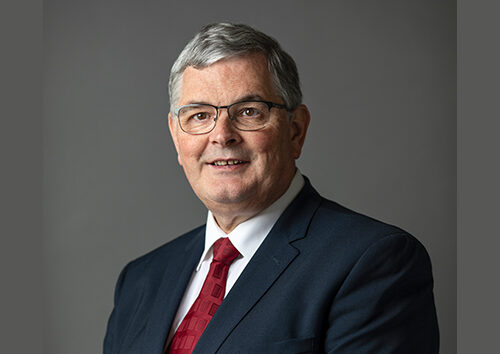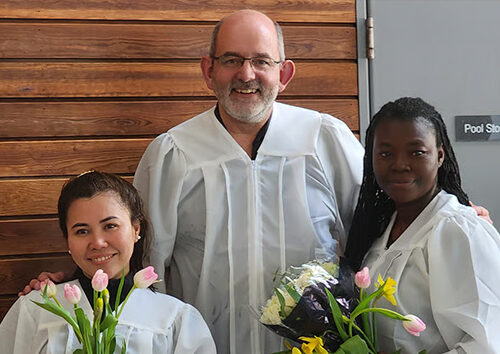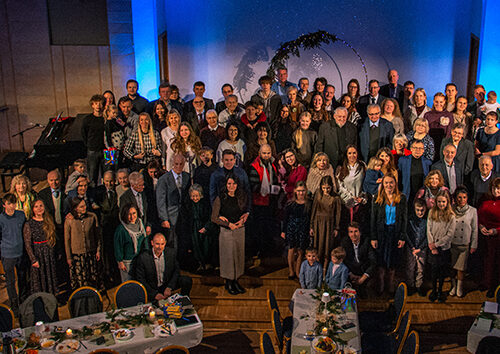22 November 2020 | Miskolc, Hungary [Paul Lockham]
“Bringing hope and helping people to be reconciled with God” is the ultimate purpose of hospital pastoral ministry while at the same time ensuring that they will not be left alone in the most challenging time of their lives.
For Christmas 2019 Erzsébet arranged for children and youth from her local Adventist church to provide a programme of music and readings to the patients of the hospice.
She seeks to visit every patient in the 22-room hospice weekly, this is on average 44 patients, and their families. Giving support to the patients and their families involves mental health care and counselling, being there for the patients in their last hours, providing spiritual support and prayer, including grief and loss seminars for families after a patient dies. Erzsébet also organises worship Services on Sabbaths and coordinates the schedule of services conducted by Catholic priests and Calvinist pastors. “Our patients are very thankful when they are able to participate in the divine services. They appreciate these events, which may be the last occasion for them, when they can listen to, can understand and accept God’s invitation.”
The Chief Medical officer of the hospice ward commented that Erzsébet is “able to give patients an understanding and loving presence, listening, facing, and accepting a seemingly hopeless future. In many cases, achieving a reduction in anxiety and fear of death. We consider the service she performs to be extremely important and will continue to demand it in the future.”
The majority of patients and their families are open to receive chaplaincy support, but Erzsébet tells of one young mother who asked for no visits from psychologists, pastors or volunteers and no mental health support. This was respected and Erzsébet confined herself to praying for the young woman. One day walking past her open ward door, Erzsébet stopped, went in, introduced herself, and although she knew of the request for no visits, she went on to simply ask if there was anything the young woman needed help with. It was a hot summer day and the patient asked for a bottle of cold water to be opened as she couldn’t do it herself. As Erzsébet was leaving the room, the young woman asked her to come again. The request for visits was readily met and Erzsébet had the opportunity to pray with the young woman a couple of times before she passed away.
Very often when patients realise there is no cure for them, they are angry and overwhelmed with a feeling of helplessness. Often when visited they will talk about themselves and their stories and Erzsébet often feels the anger they have towards God because they believe that their illnesses and sufferings were God’s doing. That is why Erzsébet takes time to be with them and open the Bible’s picture of God to them, so when the “last” days come, they will leave this earthly being, reconciled to God, with the hope of eternal life.
 Meeting around 600 people a year, Erzsébet has many stories she could share but one that is close to her heart is about an elderly man who had divorced his wife and abandoned his family about forty years ago. He asked if they could find his family because he wanted to apologise and say goodbye to them. After four weeks of trying, Erzsébet had not been able to make any contact and the elderly man’s condition was worsening daily. Then one day her phone rang, and it was one of his children. After a few minutes of conversation, the daughter said that neither she nor her siblings were willing to meet their dad. She did agree, though, that they could contact them with news of their father from time to time.
Meeting around 600 people a year, Erzsébet has many stories she could share but one that is close to her heart is about an elderly man who had divorced his wife and abandoned his family about forty years ago. He asked if they could find his family because he wanted to apologise and say goodbye to them. After four weeks of trying, Erzsébet had not been able to make any contact and the elderly man’s condition was worsening daily. Then one day her phone rang, and it was one of his children. After a few minutes of conversation, the daughter said that neither she nor her siblings were willing to meet their dad. She did agree, though, that they could contact them with news of their father from time to time.
After a number of such phone calls, the daughters finally agreed that they would visit the following weekend. Unfortunately, before that happened, their father’s health worsened and Erzsébet called the family with the sad news and then sat and read from the Bible and prayed with him. Shortly afterward, his family arrived and as he apologised to them, he finally received the forgiveness he longed for. He couldn’t speak any more but signed to them and they remained with him until he died twenty minutes after they had arrived. After that Erzsébet explained that, “He died with the belief, ‘For I know that my Redeemer lives and that at the last he will stand upon the earth’.” (Job19:25)
tedNEWS Staff: Victor Hulbert, editor; Deana Stojković, associate editor
119 St Peter’s Street, St Albans, Herts, AL1 3EY, England
E-mail: [email protected]
Website: www.ted.adventist.org
tedNEWS is an information bulletin issued by the communication department of the Seventh-day Adventist Church in the Trans-European Division. Readers are free to republish or share this article with appropriate credit including an active hyperlink to the original article.



